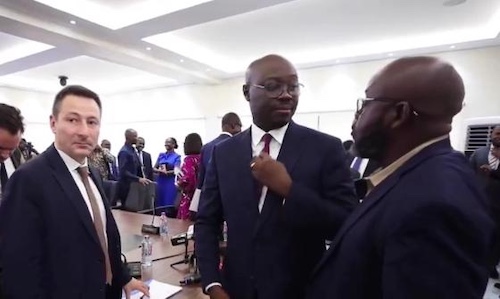Questions on the minds of many Ghanaians is ‘Will Ghana Ever Learn from its Mistakes Resulting in International Monetary Fund (IMF) Bailout?’ as the Finance Minister Dr. Cassiel Ato Forson announced a Staff-Level Agreement (SLA) with the International Monetary Fund (IMF) for the 4th Review of its $3 billion bailout program.
This agreement paves the way for a $370 million disbursement—the 5th tranche—pending IMF executive board approval, bringing total funds received since 2023 to $2.3 billion.
VIDEO: Will Ghana Ever Learn from its Mistakes Resulting in International Monetary Fund (IMF) Bailout?
Forson, addressing a joint press conference with the Ministry of Finance and the Bank of Ghana, emphasized the government’s commitment to fiscal discipline, highlighting measures like auditing 2024 payables and amending procurement laws to curb inefficiencies. These reforms aim to address a significant primary deficit of 3.25% of GDP in 2024, which had overshot the IMF’s target of a 0.5% surplus, signaling a renewed push for macroeconomic stability under President John Dramani Mahama’s administration.
The announcement comes on the heels of Ghana’s notable economic strides in 2024, particularly driven by a surge in the mining sector, which the IMF credits for bolstering growth. However, challenges remain, as the country grapples with inflation, environmental degradation from illegal mining (known as galamsey), and public skepticism about the IMF’s role.
Despite these hurdles, the government has introduced structural reforms, including a new debt rule aiming to reduce the debt-to-GDP ratio to 45% by 2035 and the establishment of an independent fiscal council to ensure transparency. Forson’s leadership, recently recognized with his election as EBID Chairman on April 15, 2025, underscores a broader vision for regional economic integration alongside domestic recovery.
For everyday Ghanaians, the $370 million tranche offers a glimmer of hope but also raises questions about tangible benefits. The funds are expected to bolster reserves and support social programs, a priority under the IMF program, which includes protecting the vulnerable through monitored spending targets.
With the mining sector’s growth juxtaposed against environmental concerns and past policy slippages, Ghana’s path to sustainable development remains complex. As the nation awaits IMF board approval, the focus now shifts to how effectively these funds and reforms can address deep-rooted challenges, setting the stage for a more resilient economic future.


